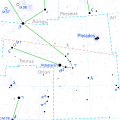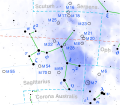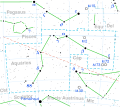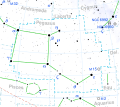Top Qs
Timeline
Chat
Perspective
Nakshatra
Lunar mansion in Hindu astronomy From Wikipedia, the free encyclopedia
Remove ads
Nakshatra (Sanskrit: नक्षत्रम्, romanized: Nakṣatram) is the term for Lunar mansion in Hindu astrology and Buddhist astrology. A nakshatra is one of the 27 (sometimes also 28) sectors along the ecliptic. Their names are related to a prominent star or asterisms in or near the respective sectors. In essence (in Western astronomical terms), a nakshatra simply is a constellation. Every nakshatra is divided into four padas (lit. "steps").
The starting point for the nakshatras according to the Vedas is "Krittika" (it has been argued, because the Pleiades may have started the year at the time the Vedas were compiled, presumably at the vernal equinox), but, in more recent compilations, the start of the nakshatras list is the point on the ecliptic directly opposite the star Spica, called Chitrā in Sanskrit. This translates to Ashwinī, a part of the modern constellation of Aries. These compilations, therefore, may have been compiled during the centuries when the sun was passing through Aries at the time of the vernal equinox. This version may have been called Meshādi or the "start of Aries".[1][full citation needed][2]
The first astronomical text that lists them is the Vedanga Jyotisha.[3][better source needed]
In classical Hindu scriptures (Mahabharata, Harivamsa), the creation of the asterisms is attributed to Daksha.[4] The Nakshatras are personified as daughters of Daksha and as wives of Chandra, the god of the Moon. When Chandra neglected his 26 other wives in favour of Rohini, his father-in-law cursed him with leprosy and proclaimed that the Moon would wax and wane each month.[5] The Nakshatras are also alternatively described as the daughters of Kashyapa.
Nakshatra is one of the five elements of a Pañcāṅga. The other four elements are:
Remove ads
In the Atharvaveda

In the Atharvaveda (Shaunakiya recension, hymn 19.7) a list of 27 stars or asterisms is given, many of them corresponding to the later nakshatras:[6][a]
- Ashwini
- Bharani (41 Arietis)
- Kṛttikā (the Pleiades)
- Rohinī (Aldebaran)
- Mrigashīrsha
- Ārdrā (Betelgeuse)
- Punarvasu (Castor and Pollux)
- Pushya
- Asleshā (ε Hydrae)
- Maghā (Regulus)
- Purva Phalguni
- Uttara Phalguni (Denebola)
- Hasta
- Chitrā (Spica)
- Svāti (Arcturus)
- Vishākhā
- Anurādhā
- Jyeshthā
- Mūla
- Purva Ashadha
- Uttara Ashadha
- Shravana
- Dhanishta
- Shatabhisha (λ Aquarii)
- Purva Bhadrapada
- Uttara Bhadrapada
- Revati (ζ Piscium)
This 27-day cycle has been taken to mean a particular group of stars. This has to do with the periodicity with which the Moon travels past the specific star fields called nakshatras. Hence, the stars are more like numbers on a clock, through which the hands of time (the moon) pass. This concept is described by J. Mercay (2012) in connection with Surya Siddhanta.[7]
Remove ads
List of Nakshatras
Summarize
Perspective

In Hindu astronomy, there was an older tradition of 28 Nakshatras which were used as celestial markers in the heavens. When these were mapped into equal divisions of the ecliptic, a division of 27 portions was adopted since that resulted in a clearer definition of each portion (i.e. segment) subtending 13° 20′ (as opposed to 12° 51+3⁄7′ in the case of 28 segments). In the process, the Nakshatra Abhijit was left out without a portion.[8]: 179 However, the Abhijit nakshatra becomes important while deciding on the timing of an auspicious event. The Surya Siddhantha concisely specifies the coordinates of the twenty-seven Nakshatras.[8]: 211
It is noted above that with the older tradition of 28 Nakshatras each equal segment would subtend 12.85 degrees or 12° 51′. But the 28 Nakshatra were chosen at a time when the Vedic month was recognised as having exactly 30 days. In India and China the original 28 lunar mansions were not equal. Weixing Nui provides a list of the extent of the original 28 Nakshatras expressed in Muhurtas (with one Muhurta = 48 minutes of arc). Hindu texts note there were 16 Nakshatras of 30 Muhurtas, 6 of 45 Muhurtas, 5 of 15 Muhurtas and one of 6 Muhurtas.
The 28 mansions of the 360° lunar zodiac total 831 Muhurtas or 27.7 days. This is sometimes described as an inaccurate estimate of our modern sidereal period of 27.3 days, but using the ancient Indian calendar with Vedic months of 30 days and a daily movement of the Moon of 13 degrees, this early designation of a sidereal month of 831 Muhurtas or 27.7 days is very precise.[b][9][full citation needed] Later some Indian savants dropped the Nakshatra named Abhijit to reduce the number of divisions to 27, but the Chinese retained all of their original 28 lunar mansions. These were grouped into four equal quarters which would have been fundamentally disrupted if it had been decided to reduce the number of divisions to 27.
Irrespective of the reason why ancient early Indian astronomers followed a Vedic calendar of exactly 12 months of 30 days it was this calendar and not a modern calendar of 365 days that they used for the astronomical calculations for the number of days taken for the Moon to complete one sidereal cycle of 360°. This is why initially they named 28 Nakshatras on their lunar zodiac.[10]
The following list of nakshatras gives the corresponding regions of sky, per Basham (1954).[11]
Remove ads
.mw-parser-output .vanchor>:target~.vanchor-text{background-color:#b1d2ff}@media screen{html.skin-theme-clientpref-night .mw-parser-output .vanchor>:target~.vanchor-text{background-color:#0f4dc9}}@media screen and (prefers-color-scheme:dark){html.skin-theme-clientpref-os .mw-parser-output .vanchor>:target~.vanchor-text{background-color:#0f4dc9}}Padas (quarters)
Summarize
Perspective
Each of the 27 Nakshatras cover 13° 20’ of the ecliptic. Each Nakshatra is also divided into quarters or padas of 3° 20’, and the table below lists the appropriate starting sound to name the child. The 27 nakshatras, each with 4 padas, give 108, which is the number of beads in a japa mala, representing all the elements (ansh) of Vishnu:
Remove ads
See also
Notes
- Abhijit is the 22nd lunar mansion in the Indian system of 28 nakshatras. According to traditional beliefs, it is not necessarily a separate nakshatra per se, but rather a division within the sidereal Capricorn sign, spanning from the fourth pada of Uttara Ashadha to the first pada of Shravana.
- From Griffith (1895) Hymns of the Atharva Veda:[6]
1 citrā́ṇi sākáṃ diví rocanā́ni sarīsr̥pā́ṇi bhúvane javā́ni
turmíśaṃ sumatím ichámāno áhāni gīrbhíḥ saparyāmi nā́kam
2 suhávam agne kŕ̥ttikā róhiṇī cā́stu bhadráṃ mr̥gáśiraḥ śám ārdrā́
púnarvasū sūnŕ̥tā cā́ru púṣyo bhānúr āśleṣā́ áyanaṃ maghā́ me
3 púṇyaṃ pū́rvā phálgunyau cā́tra hástaś citrā́ śivā́ svātí sukhó me astu
rā́dhe viśā́khe suhávānurādhā́ jyéṣṭhā sunákṣatram áriṣṭa mū́lam
4 ánnaṃ pū́rvā rāsatāṃ me aṣādhā́ ū́rjaṃ devy úttarā ā́ vahantu
abhijín me rāsatāṃ púṇyam evá śrávaṇaḥ śráviṣṭhāḥ kurvatāṃ supuṣṭím
5 ā́ me mahác chatábhiṣag várīya ā́ me dvayā́ próṣṭhapadā suśárma
ā́ revátī cāśvayújau bhágaṃ ma ā́ me rayíṃ bháraṇya ā́ vahantu[6]
- The exact figure should be nearer 27.692308 days but 27.7 is near enough.
Remove ads
References
External links
Wikiwand - on
Seamless Wikipedia browsing. On steroids.
Remove ads



















